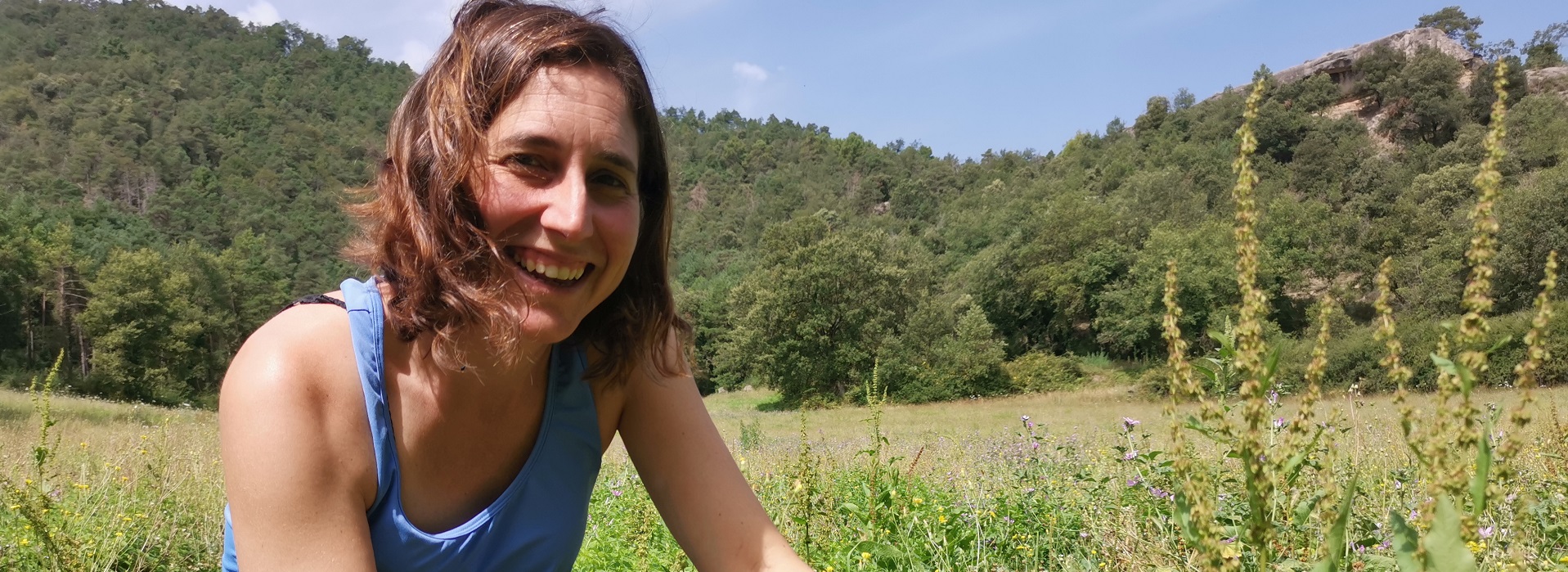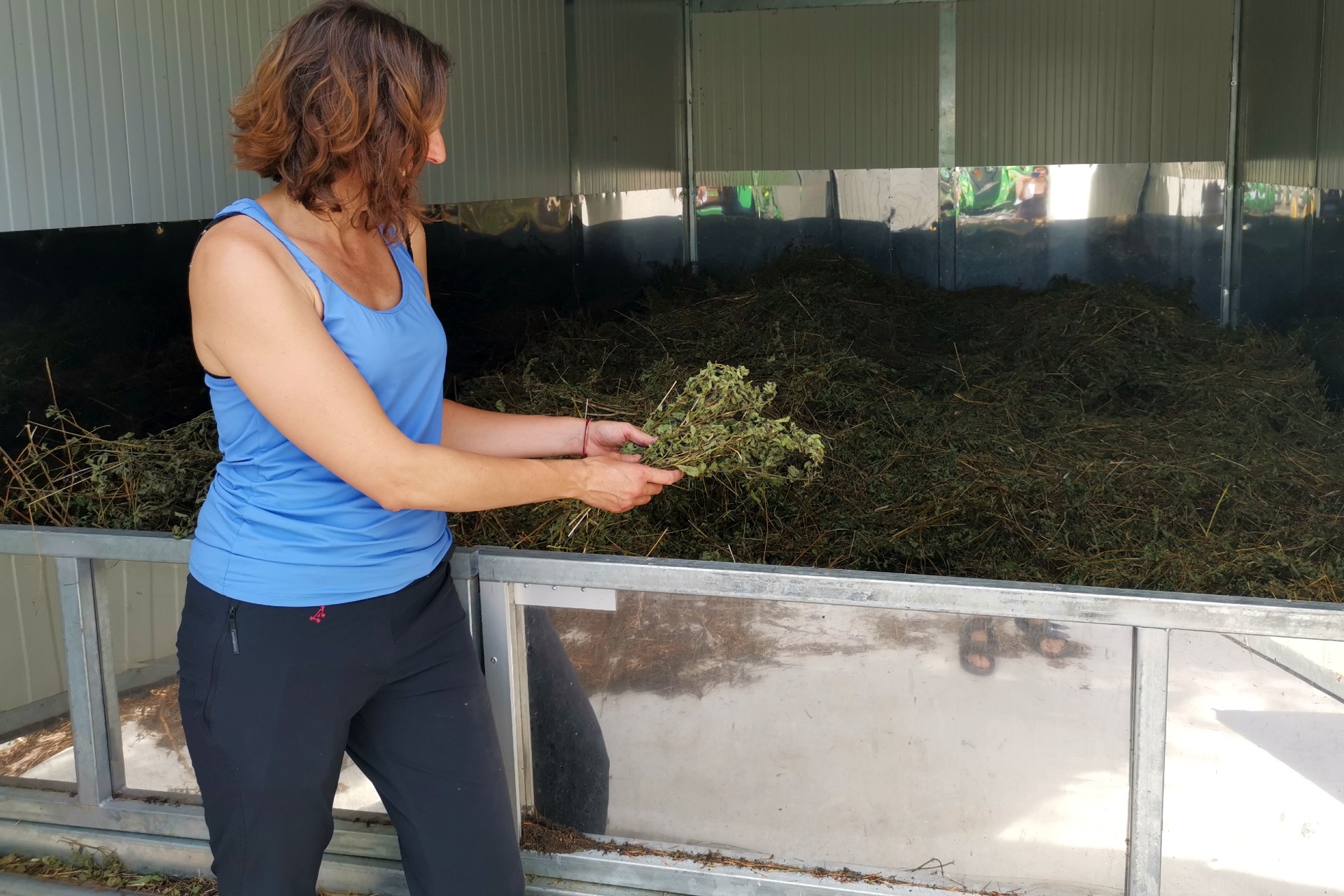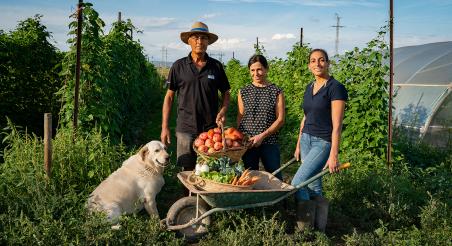Glòria Roig (Barcelona, 1983) is bursting with joy on her farm in the village of Lluçà. She loves her job and enjoys close contact with the land. What’s more, her sanguine, light-hearted temperament is perfect for dealing with the challenges that arise when the harvest goes awry. She lives in the farmhouse with her partner and three daughters, aged four, nine and eleven years old. Before settling in the heart of the Lluçanès area, Glòria lived in Lleida, although her roots lie in Barcelona. In fact, her family is well known for the sweet aromas that emanate from its pastry shop, La Colmena, located in Barcelona’s Plaça de l’Àngel. Founded by Glòria’s great-grandfather, the establishment is popular among locals and tourists alike, keen to enjoy the delights of a traditional Catalan pastry shop.
As we stroll around Glòria’s farm, we’re struck by the number of different animals that follow her around: horses, dogs and cats, whom she introduces by name. We’re also impressed by the size of the farm, which covers a total of 130 hectares (100 hectares of forest and 30 hectares of cropland). Glòria cultivates one and a half hectares of organic orange blossom, following principles similar to those of regenerative agriculture, and one hectare of organic hops, using a support irrigation system. The hops, which Glòria is growing under the guidance of Biolupulus, are currently being trellised and are still not mature enough for a harvest this year. The rest of the fields host a wide variety of crops.
Glòria is the incumbent president of the Lluçanès Forest Owners Association and serves as a representative at the Farming Association of Lluçà. Although she settled in the area less than a decade ago, she’s already established strong ties with local farmers. She’s organised an exchange system with one of her neighbours: she does his paperwork for him and he lends her agricultural machinery or works her fields. Glòria is not one to be fazed by obstacles and she’s happy with the decision she made eight years ago to embark on a farming career.
You were born in Barcelona, you’ve lived in Lleida and now you’re a farmer in the Lluçanès area. How did you end up in this part of the world?
I studied Agricultural Technical Engineering in Barcelona, and then I went to Lleida to do my higher diploma. I met my partner there and stayed on to work there once I’d completed my diploma. I also continued my training, completing a master’s degree in integrated crop protection. But lo and behold, when I was pregnant with my second daughter, Anna, I was dismissed from my job. I did some job interviews, but no one hired me. Three days before giving birth, we came to have a look at this farm. My father had been offering to help us out and was always encouraging me to start up a business. It seemed like the right time to do it. Finding suitable land is very difficult. At first, when I saw the location of the farm, I had my doubts, but a year after giving birth, unable to find any other option, we decided to go for it. The farm owner was in a hurry to sell and with the help of my family we were able to buy it. Then I registered as a young farmer.
What led you to choose aromatic plants as a crop?
Initially, all I wanted to do was grow grain, thinking that this would enable me to combine farming with raising my kids, sitting on the tractor all day. Ha, ha, ha! But in order to register as a young farmer with grain crops, I needed to have at least 50 hectares of land… So I had to look for alternatives. One day I discovered aromatic plants and decided to train in this field. I went to see a producer who grew orange blossom, a plant that fights weeds extremely well. I decided that I’d grow it organically, adopting practices similar to those of regenerative agriculture. I found it an interesting crop because there aren’t many people who grow this type of aromatic plant. However, a wholesaler in Alicante takes care of the sales side. If I had to sell the crop directly myself, I wouldn’t be able to juggle the job with my responsibilities as a mother.
Was the possibility of combining your farming work with raising your daughters one of your priorities when choosing a career in the profession?
Yes, I find that farming is very compatible with looking after the girls. Not so much in summer, of course, when they’re off school and it’s a particularly busy time of year in the fields. But, you know, I’ve got a carefree attitude and get on with my work while they run around the place. My eldest daughter, who’s 11 years old, told me the other day that she felt ready to babysit her sisters. I replied that, in actual fact, she’s already doing it. Ha, ha, ha!
Does being a mother help you be a farmer?
I guess it does, I hadn’t really thought about it. It’s so fantastic, being a mother! What I like the most is the home life the girls are getting, seeing that their mother’s a farmer and being proud of her. When I get on the tractor, they don’t bat an eyelid. Their friends aren’t overawed by my job either. I find that extremely valuable. It’s a huge shift in attitude.
«What I like the most is the home life the girls are getting, seeing that their mother’s a farmer and being proud of her» Glòria Roig
Why do you like farming? Which aspects do you find most attractive?
Farming’s a very physical job, which suits me because I always need to be on the move! I love being my own boss and doing what I want – that pretty much sums up my attitude to life. At the same time, you can’t let yourself get too stressed if you want to be a farmer. For example, a couple of weeks ago we had a big hailstorm which destroyed 40% of my wheat crop. These things can happen and you can’t do anything about them! It’s the same out in the fields. If it’s not possible to harvest absolutely everything, what are you going to do? That’s the attitude I’ve got. In another job, you might need a completely different skillset, but in farming you have to keep a cool head and learn to accept things.
Do you think coming from a pastry-making family affects your perspective and appreciation of the agricultural sector?
No, they’re really two different worlds. One year we did make panellets at La Colmena with my mint: mojito panellets. Ha, ha, ha! But when I think about what I’m doing now, there’s no connection. I’ve got three siblings and the future of the pastry shop is already secure, which is something I’m very proud of. My father visits us every week and fills the house with packages from La Colmena!
Becoming a member of the new farming generation has changed your life. Taking stock of this, what do you appreciate the most?
Coming from Barcelona as I do, living here is a gift. Every Christmas I help my parents out at La Colmena. When I come back here afterwards, I feel like I can breathe again. It’s quite a contrast! For example, the girls attend a rural school, while in my school there were 42 students per class! It’s completely different. Both in the countryside and the village, Lluçà, I’ve felt very much at home. I don’t know whether others have had the same experience as me, but I’ve been made to feel extremely welcome. In fact, I’ve been appointed as a representative of several organisations!
What do you think is your most outstanding contribution as a representative? What do you think you offer with your particular outlook?
I was told that I had more drive: small farmers are tired, because they’ve been working hard all their lives. But what would we do without them? The farming profession is looked down on, but I think farmers do things better than people say. We’re criticised for working the land, we’re criminalised for issues related to liquid manure... What’s more, our land is in danger if there’s a wildfire!
«The farming profession is looked down on, but I think farmers do things better than people say» Glòria Roig
The contamination of aquifers by liquid manure from livestock is an issue that has an impact on land use. Who do you think is responsible for this problem?
We all bear part of the responsibility on this issue. It’s true that some things haven’t been well handled, but the main problem is that there are so many pigs. But if you’ve always kept livestock and people buy it, what can you do? It’s your source of income! Ultimately, there are many factors that don’t depend on us. With the low prices we’re paid for our products, it’s hardly surprising that we live off subsidies... We get criticised for this, but farmers simply can’t make a living without subsidies.
«With the low prices we’re paid for our products, it’s hardly surprising that we live off subsidies... We get criticised for this, but farmers simply can’t make a living without subsidies» Glòria Roig
How do you adapt and ensure the economic viability of your agricultural project?
I love challenges, but sometimes it would be nice to earn a wage from my work. I haven’t stopped investing in the farm since I came here. It’s been eight years now and I still haven’t drawn a salary. Ha, ha, ha! In the early days I received the grant for young farmers starting out in the profession. But if you get stuff done on the farm, it soon runs out. Basically, everything I earn I invest in the project and if I get any grants, I invest them as well. It’s like a wheel! Fortunately, my partner draws a salary. And I didn’t come here to get rich; what I like about being here is the quality of life.
The fact that you were able to purchase your farm is an advantage.
I’m glad I’ve been able to enjoy my inheritance now and I don’t regret anything I’ve done. I love being here.
As Vanesa Freixa points out in her book Ruralisme, the right to access to land is as fundamental as it is hotly debated. She also reminds us that around 70% of the world is fed by small-scale farmers, who only manage 20% of the total agricultural area. The rest of the land is in the hands of agribusiness. How do you see the Catalan agricultural sector 25 years from now?
To be honest, I don't think it’ll change much. I’d like to see a one-percent increase in the number of people in the primary sector, but it’s unlikely to happen. Two farmers in the Lluçanès area are retiring and there’s nobody to take over the reins. What I think will happen is that a handful of large companies will dominate the entire sector.
When you were a student, did you think you’d become a farmer?
No, I had the mindset of an agronomist, which is completely different from being a farmer. Thanks to my studies, I’m able to do all the paperwork myself and save a lot of money that way! It’s amazing the amount of red tape you have to deal with and all the deadlines you have to meet. A farmer who hasn’t got a clue about technology has to pay someone else to do these tasks, and that’s a shame.
«Thanks to my studies, I’m able to do all the paperwork myself and save a lot of money that way!» Glòria Roig
In addition to the obstacles created by bureaucracy, the sector is faced with the challenge of generational renewal. How do you deal with this challenge in your part of the world?
Yes, without a doubt. One of my neighbours in the Lluçanès area, a lifelong farmer, has a son who wants to follow in his footsteps. He loves the profession. But his father has told him not to go into farming, and now the young lad has two other jobs. It’s pretty remarkable that his own father has advised him against it!
Your daughters are still very young, but would you like them to run the farm when they grow up?
I’d love for one of them to take over the reins, of course. But I won’t force anyone, and I don’t hold out much hope. Maybe they’ll want to move to the city... But when you’ve got three children, the chances are greater! That said, generally speaking, generational renewal is an extremely complicated issue. One of the reasons for this is that farmers who’ve spent their entire lives in the profession find it hard to retire. It’s what they’ve always done and they don’t want to quit.
Taking stock, are you satisfied with the life you lead?
My life is fantastic, but I realise I’ve had it very easy. I’ve worked hard, but I acknowledge that if you don’t have support, it’s very difficult to get started. Finding land is extremely complicated, especially at the beginning.
Do you have any specific plans or goals for your business?
We’d like to start a rural tourism project on the farm, but we’re taking things slowly.
— BCN Smart Rural Editorial —




